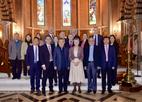"I have a dream that our Chinese church should turn into the church in Acts. This is called revival, not merely done with many people or many being baptized. It means that we should recover to the church in the time of Acts." Rev. Dennis Balcombe (widely named Bao De-ning in China) said in the opening ceremony of 2016 Chinese and Korean Revival Conference held on Jeju, Korea, on September 26.
Born in California, the white pastor says he was born for China and his fellow workers who have been cooperating with him for years claim that he has a Chinese heart. He confirmed God's calling at 16 and went to Hong Kong to learn Chinese in 1969. He has visited China for several times since 1978 and witnessed the revival in Chinese house church in the past decades, ministering them in the process.
Recently the Christians Times(基督时报), a Christian online newspaper in Mainland China, interviewed Rev. Dennis Balcombe to talk about his observation and reflection of the Chinese church.
Christian Times: Rev. Bao, you confirmed the calling of evangelizing in China in 1961 and settled down in Hong Kong in 1969, learning Chinese. Then you visited the mainland China in 1978 when China began the opening up and reform. What's more, you have experienced the revival and growth of Chinese house church you serve as the witness. What stages, in your view, has the Chinese church gone through in the previous three decades?
Rev. Dennis Balcombe: The church experienced many persecutions in the beginning (the late 1970s and the early 1980s), which, on the contrary, contributed to the unity of churches. They prayed and depended on God, therefore embracing a large revival. Spiritual revivals took place in Henan, Anhui and the northeast China. The churches there experienced many wonders and miraculous signs. They were very healthy, praying and preaching the gospel, despite being persecuted.
The reform and opening up policy brought about good things and also bad things. For instance, there came a big material temptation, moreover, many overseas denominations were eager to establish their branches back in China. Later, the Chinese church was divided into the three-self church and the house church for historical reasons.
Actually, whether the church should be registered and hand over the right of managing its internal affairs to the government or not is a faith issue for ordinary Chinese Christians. The fact that the house church refuses to join in the three-self church is the disagreement with liberal theology. So materialism, secularism and the prosperity theology that enter into China have a negative impact on the Chinese church now. Founding denominations in China is not a good thing for the Chinese church because this will bring church division.
However, the reform has produced something good that Chinese can evangelize in a wider range, able to preach the gospel overseas except China. For example, the missionary movement Back to Jerusalem appears and many Chinese believers are evangelizing in the Middle East.
Christian Times: You talked about the growth, change and the current challenges of the Chinese church in the latest decades. As a witness who also experienced them, what impressed you the most?
Rev. Dennis Balcombe: It's good that Chinese desire studies in my eyes, such as attending theological seminaries or reading books. They are humble and willing to receive gifts. However, sometimes Chinese can't make a clear distinction between right and wrong due to a lack of teachings.As a result, many extreme teachings and cults rise, such as Eastern Lightning.
Why do we start with teachings? I believe that the truth should be balanced. Some oppose Pentecostalism, claiming that there is no wonders and signs after the Apostolic Age, so the movement is unreasonable and not true.And it is the same with God's predestination. So we should offer good teachings with balanced truth according to the situation in China.
If the reform and opening up hadn't been introduced in China, these things may haven't entered into the country and more problems could have occurred. As a matter of fact, these problems already existed in the history. Unfortunately, these overseas things reached China. The country faces a larger challenge along with many domestic cults like the Shouters sect, Eastern Lightning, Three Grades of Servants, the Anointed King( or Bei Liwang in Chinese).
But how to face it? I hope that China can be really open to religions.I have said for several times that it's okay for the house church to be registered and the fundamental problem lies in faith. It won't be acceptable if a preacher from a three-self church is sent to nurture in a house church after registration for they have different theological standpoints.
My second suggestion is that the stronger crackdown you strike on the cults and heresies, the harder you will find them.What's worse, a religious team will develop more rapidly if you put it down.On the contrary, if there is freedom of belief in China that we can buy religious books in bookstores and preach the gospel publicly, that will solve 70% to 80% of the issue of cults and heresies. Anyway, God will absolutely lead the Chinese church.
I think the most optimistic future will be that the Chinese church may become a real "three-self" church that supports itself without receiving any overseas funding. Instead, it can carry out missions in foreign countries.
To be continued.
- Translated by Karen Luo










